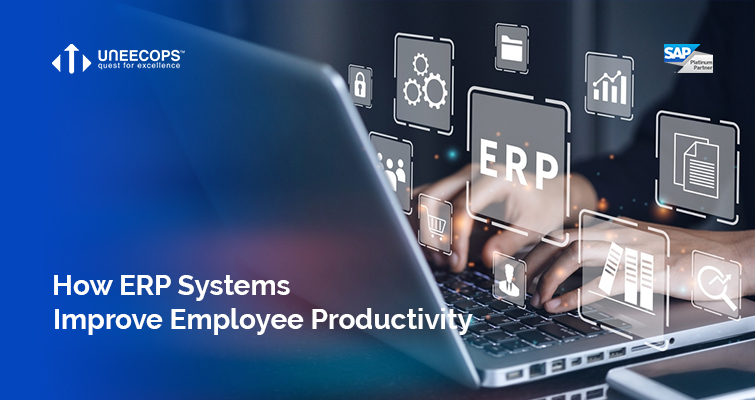It is common knowledge that an ERP system increases the efficiency and productivity of an organization as a whole. It is capable of offering a ton of features that greatly help the organization in achieving its defined goals. But let’s not forget that the most important asset of any company is its employees. In this cut-throat competitive world, companies are making sure that their money is being spent and utilized smartly on employees. In return, they command high productivity. A smooth amalgamation between man and machine also becomes increasingly necessary. Providing them with necessary information at the right time and the right resources improves their efficiency. Thus empowering employees by giving them timely information boosts productivity, and this is exactly what an integrated information system—an enterprise resource planning (ERP) system—does. Almost all SAP B1 partners in India would agree to that ERP systems improve employee productivity.
Initially, the employees were responsible for a lot of manual work. This resulted in a lot of precious time being spent on menial jobs, like backing up their own data, submitting it in different forms to different parts of the organization, and maintaining the software to manage the data. The time spent on this otherwise could have been utilized to design better business strategies and the like. Now all these tasks can be automated by implementing an ERP system. They can be done by simply entering the new or updated data into one central system, i,e, the ERP system. A lot of these manual, repetitive tasks that are associated with the data can be easily automated, which in turn saves up a lot of time. When the time saved on each task individually is added up, a large overall amount of time can be saved for each employee. This means that employees can utilize that saved time to work on other tasks, and hence boost productivity. At an individual employee, this definitely is very beneficial. At a company level too, a rise in productivity can be observed if cloud ERP is implemented. With the central database being stored in the cloud, time that was previously devoted to data synchronization, software management, and tracing faults and inaccuracies becomes available for more productive tasks, thus reducing costs.

An increase in employee productivity can also be found in areas that aren’t part of direct manufacturing or production costs. Employees who are a part of other departments can greatly benefit from an ERP system. Since most of the work is automated and human taskforce isn’t required, it may be argued that an ERP can possibly compel to cut down on the size of the work force. But in the contrary, if a state-of-the-art ERP system is used then it helps create an environment that boosts indirect labour productivity. If smart business practices are implemented like delegating decision making, then it can help control wasted labour. Along with a good ERP solution, the labour can achieve high productivity.
But according to SAP B1 partners in India, high employee productivity cannot be achieved until each employee in the organization has access to an ERP system. Once SAP B1 partners set up an ERP system and train every employee on how to efficiently utilise the benefits, then every member of staff can save a lot of time to perform their tasks as compared to traditional methods. Tasks like running applications based on the data, invoicing, accounts and customer services are among those areas that need precision. With ERP, these tasks can be done reliably, without wasting a lot of time for updates to be downloaded from elsewhere in the company. Since the data is ready and waiting, so that the overall capacity for productivity in the company is increased, and time can be spent on operating the business.
It all comes down to how the data in a company is processed. Once the time and effort can be cut down and instead smart work can be done, half the battle is won. There is no doubt that ERP increases employee productivity.






